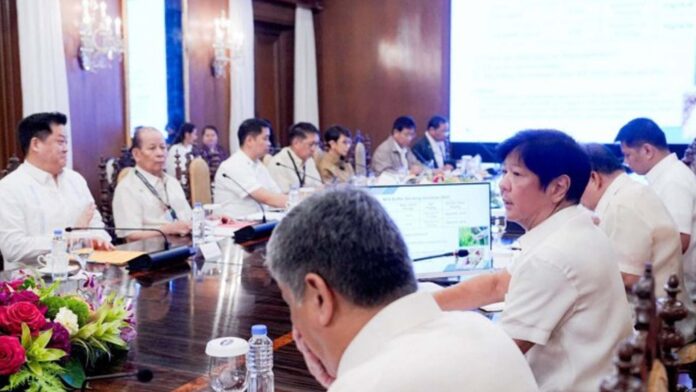The National Food Authority (NFA) Council chaired by President Ferdinand R. Marcos Jr. set on Monday a new palay (unhusked rice) buying price to improve farmers’ income.
“Nagtawag ako ng meeting ng NFA Council para tingnan ang paano ang pwedeng gawin para ang presyo ng pambili ng NFA sa palay, ‘yung wet at saka ‘yung dry, ay kailangan nating tingnan dahil nagbago na ang sitwasyon. (I called a meeting of the NFA Council to see what we can do about NFA’s purchase price of rice, the wet and then the dry, we have to look because the situation has changed),” Marcos said following the meeting of the NFA Council.
Marcos said the buying price of dry palay was increased to PHP23 from PHP19 while wet palay will be from PHP16 to PHP19 to give Filipino farmers better income.
The NFA said the originally proposed PHP20 and PHP25 buying prices are too high and will spike retail prices, noting that the new decided price range, balances the profit of farmers and will not affect the retail prices as much.
The agency said if the new buying price of dry palay is at PHP23, the procurement fund needed will be PHP15 billion at the maximum, while if it is pegged at PHP25, PHP16 billion will be needed for palay procurement.
To ensure that the imported rice will not enter the market since it should only serve as a buffer, NFA said that based on its earlier discussion, the buffer is only for the poor.
It also promised to supply poor households and take that out of the demand side of the market so that it can put less pressure on the price in the market.
The NFA is also looking at providing physical rice stock instead of cash assistance.
Meanwhile, the Department of Agriculture (DA) said it would support the NFA proposal but only at a level of PHP23 a kilo.
Asked by the President on the influence of NFA’s buying price as well as the public reaction, National Economic and Development Authority (NEDA) Secretary Arsenio Balisacan said at the farm gate level, NFA procurement will be concentrated in areas where there is excess supply relative to local demand.
“In that case it can help elevate farm gate price,” Balisacan said.
The government is ramping up efforts to make rice prices more affordable.
In a separate Viber message, Finance Secretary Benjamin Diokno said the executive department is discussing at the highest level the proposal to reduce import tariffs on rice as part of a comprehensive strategy to reduce prices for consumers and mitigate a potential shortage of the staple due to the impact of the El Niño phenomenon.
“As discussions are underway, the Department of Finance (DOF) maintains its support for an appropriate policy response that promotes the greatest good for the greatest number of Filipinos,” Diokno said.
Diokno earlier proposed the reduction of the 35 percent rice import tariff rates, both Association of Southeast Asian Nations and MFN (most favored nation) rates, temporarily to zero percent or a maximum of 10 percent to arrest the surge in rice prices.
“Rest assured that the DOF, in coordination with other relevant government agencies and stakeholders, shall pursue programs and support measures to balance the interests of domestic rice farmers while keeping rice affordable for consumers — especially the poorest households,” he said. (PNA)





















